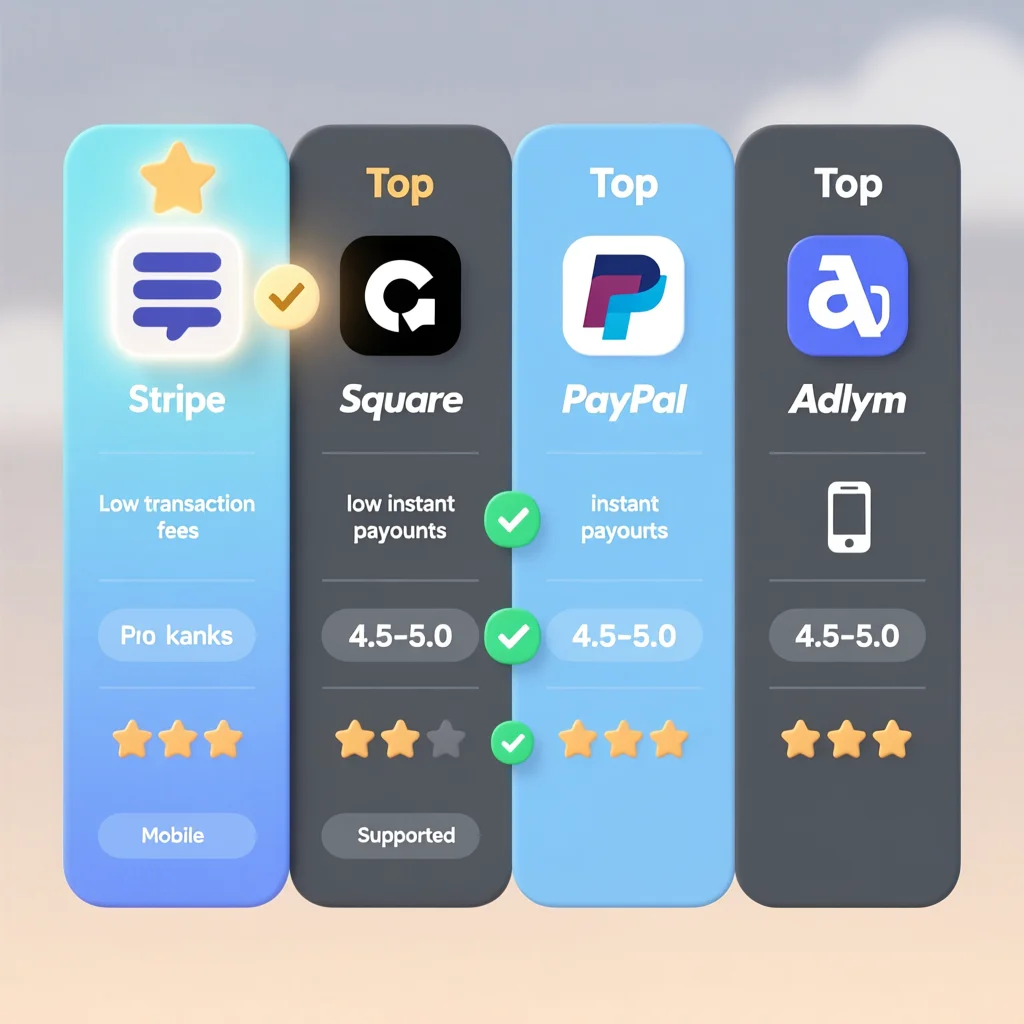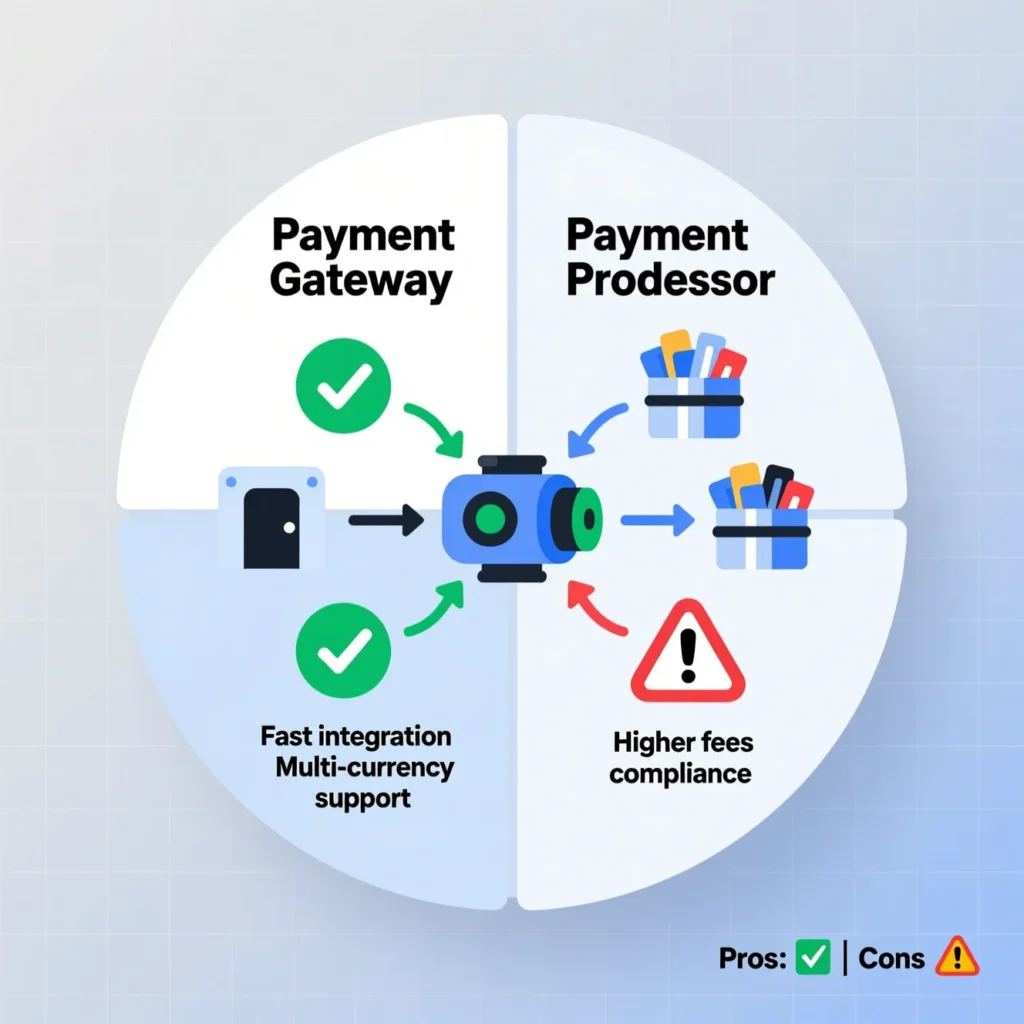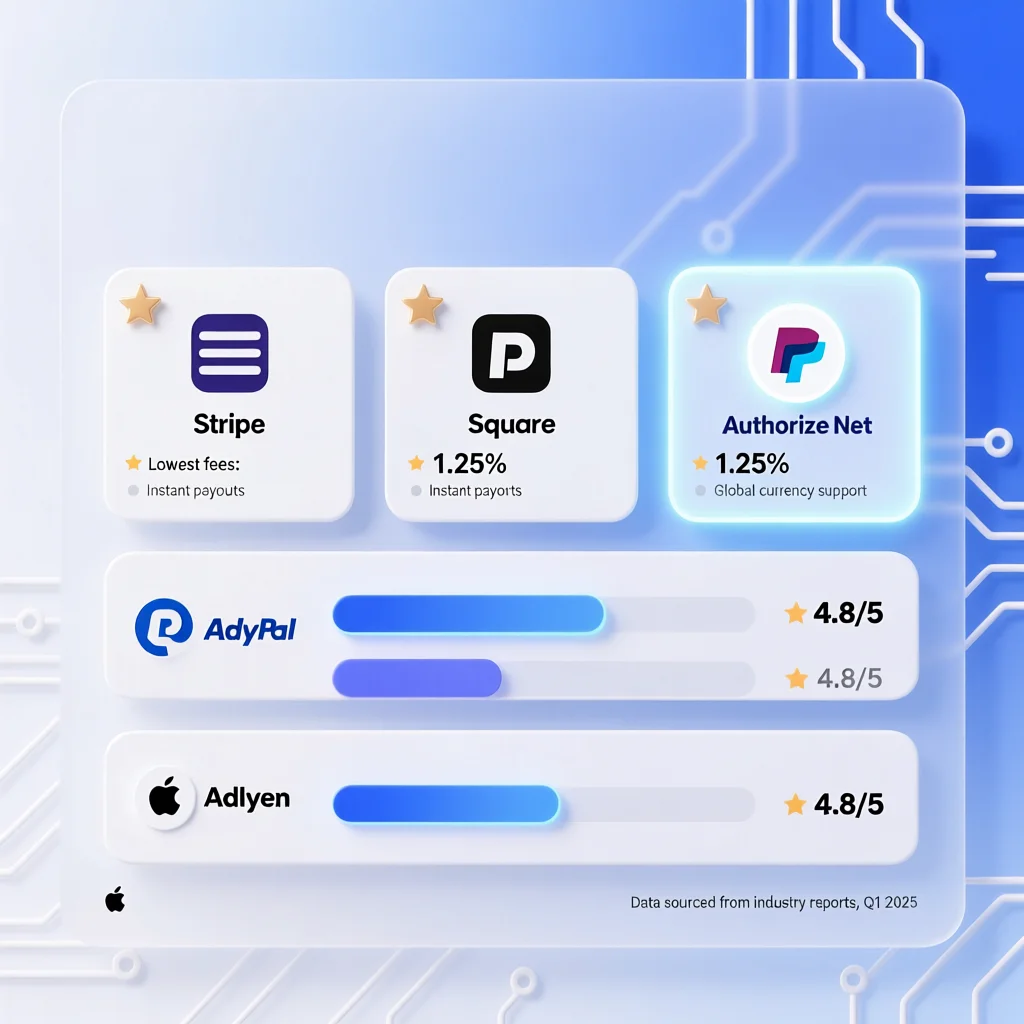If you’re running a small business and want to accept payments smoothly (online, in person, or both), you need a solid payment processor. But not every processor is created equal. The best payment processor for small business is one that balances low fees, reliability, ease-of-use, and integrations for your setup.
In this article, you’ll learn:
- The difference between payment gateway vs payment processor (yes, they’re different)
- What features really matter for small businesses
- My hands-on tips from real integration experiences
- Top contenders in 2025 and how to pick the one that fits you
Let’s dive in.
Payment Gateway vs Payment Processor: what’s the difference?
A lot of people use these terms interchangeably, but they serve distinct roles.
- A payment gateway is the front-end tool (website form, interface) that encrypts and sends customer card data securely.
- A payment processor is the service that routes that transaction data among the merchant, card networks, and banks, authorizes it, handles settlement, and deals with fraud or disputes.
In short: the gateway is the messenger, while the processor actually moves money.
Some vendors bundle the gateway + processor together (simpler for you).
When choosing a payment solution, know which functions are included and which require extra add-ons.
What matters most in a payment processor for small business
From my experience working on small business and e-commerce setups, the following criteria separate the good from the great.
Fee structure & transparency
- Look for interchange-plus or flat-rate pricing; avoid opaque markups.
- Watch for hidden charges: monthly fees, PCI compliance fees, chargeback fees, termination fees.
- I once saw a merchant lose 0.5% more per sale simply because the processor charged “settlement fees” buried in small print.
Settlement speed & cash flow
- “Next-day” or “same-day” settlement is ideal; you want your money in your bank fast.
- If your business is cash-constrained, slow settlement can hurt.
- Some processors batch settlement at end-of-day, which may introduce delays.
Integration & ease-of-use
- Plugins or native integrations (Shopify, WooCommerce, etc.) make setup fast.
- Good documentation, SDKs, sample code, and responsive developer support are gold.
- The smoother the setup, the less friction (and fewer errors) you’ll face.
Device & channel support
- Will you sell in-person (POS) too? Then your processor should support card readers and offline modes.
- Hybrid businesses (online + physical) need a unified infrastructure.
- Terminal or hardware availability matters if you also have brick-and-mortar.
Security, compliance & fraud tools
- PCI DSS compliance is non-negotiable.
- Tokenization, encryption, 3D Secure, AVS/CVV checks, fraud scoring — good processors include these.
- Dispute / chargeback support: a smooth process helps you survive disputes.
International & multi-currency support
- If you plan to sell globally, accepting foreign cards and handling currency conversion is important.
- You’ll need clear policies on foreign transaction fees and cross-border processing.
Scalability & cost as you grow
- A processor that works great at $5k/month but becomes expensive at $100k/month isn’t ideal.
- Volume discounts, custom pricing, or enterprise tiers can help as you scale.
Real-world anecdotes & lessons learned

From working on e-commerce integrations, here are a couple of stories you’ll appreciate:
- I integrated a popular all-in-one processor for a small boutique. On launch day, orders spiked. The processor had a “fraud threshold” that flagged many legitimate large orders as fraud, holding them for manual review. We had to adjust thresholds quickly to avoid losing sales.
- Another instance: a client switched processors mid-month and didn’t notice the new one had 3-day payouts instead of next-day. That cashflow delay forced them to delay supplier payments.
- Always do a test sale of low value after configuration and simulate a refund to verify that the money flows as expected. Never assume it works out-of-the-box.
Top Payment Processors for Small Businesses in 2025
Here are strong contenders you should evaluate (their pros, trade-offs, and ideal use cases). These are commonly recommended by reviews and community feedback.
Stripe
- Highly developer-friendly and feature-rich (subscriptions, advanced APIs).
- Supports global payments, multiple currencies, and custom workflows.
- Might be more technical than a plug-and-play option.
Square
- Great for hybrid small businesses (online + physical).
- User-friendly POS hardware + payment processing in one ecosystem.
- Good choice if you have in-person sales or want simple setup.
PayPal / PayPal Payments Pro
- Trusted brand, widespread acceptance, easy checkout for buyers.
- Many shoppers already have PayPal accounts — fewer barriers to buy.
- Watch out for higher fees or limitations on large sales.
Authorize.Net
- Longstanding, reliable choice especially for online merchants.
- Strong support, fraud tools, and compatibility with many gateways.
- Might require merchant account or additional services.
Helcim
- Known for transparent pricing and volume discounts.
- Often praised in small business forums for clarity.
- Good pick when your volume is moderate and you value fairness.
Local / regional processors
- Don’t ignore local solutions — sometimes they offer better support, lower fees, and familiarity with local banks.
- Many small businesses benefit from processors with physical presence nearby.
How to choose
| Business type / need | Best fit / criteria | Suggested processors to consider |
|---|---|---|
| Online-only, developer resources | Strong APIs, multi-currency | Stripe, Authorize.Net |
| Retail + online (hybrid) | POS support, unified hardware | Square, Stripe + hardware |
| Heavy international sales | Low cross-border fees, multi-currency | Stripe, PayPal (global), specialized processors |
| Low volume, limited setup time | Plug-and-play simplicity | PayPal, Square, bundled gateway+processor |
| Transparent pricing | No hidden fees, clear statements | Helcim, Stripe (with clear pricing) |
| Local presence support | Local service, local bank integration | Regional processors that serve your country |
Also, don’t forget to negotiate or ask for custom pricing once you pass certain volume thresholds.
Payment gateway + processor bundles: pros & cons
Because many payment gateway providers also act as processors, you often can get bundled services.
Pros:
- Single contract, simplified management
- Usually easier setup
- Fewer parties to coordinate in case of issues
Cons:
- Less flexibility (if gateway and processor are tightly coupled)
- If that provider has downtime, both your gateway and processing fail
- You may lose leverage for negotiation at scale
My suggestion: for small business scale, bundles are convenient. As you grow, consider unbundling or using specialized components if needed.

Checklist: questions to ask before you commit
- What is the effective transaction fee (including hidden/extra fees)?
- How fast is payout (same day? next day?)
- Do they support refunds, chargebacks, and dispute management?
- What integrations (e-commerce platforms, POS systems) are supported?
- Is their hardware available in my region (if needed)?
- What are deposit hold policies or reserve requirements?
- What fraud/facility tools are included?
- Are there monthly/minimum fees, setup fees, or exit fees?
- How well is customer and technical support (local, 24/7?)
- Can I scale my plan, negotiate rates at higher volume?
Use this as a due-diligence checklist.
Choosing the best payment processor for small business isn’t just a technical move—it’s a strategic decision. Pick one that fits your current needs, but also allows room to grow.
To recap:
- Know how payment gateway vs payment processor differ
- Focus on fees, settlement speed, integration, security, and scalability
- Use trial or sandbox modes and test transactions
- Start with a solid, reputable provider; later you can reconsider custom setups
